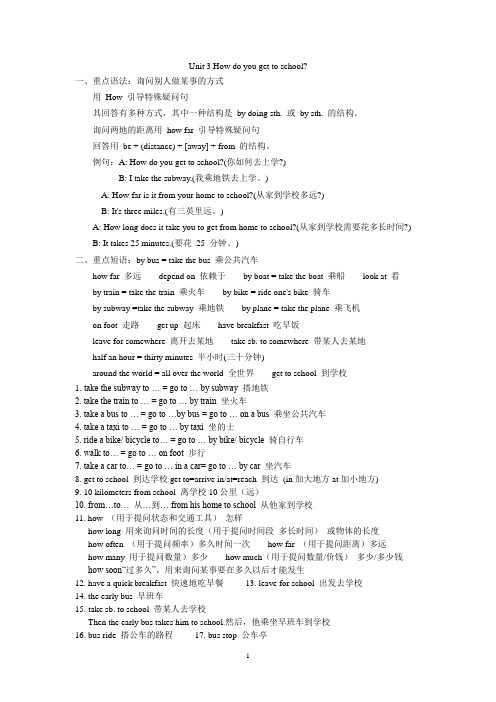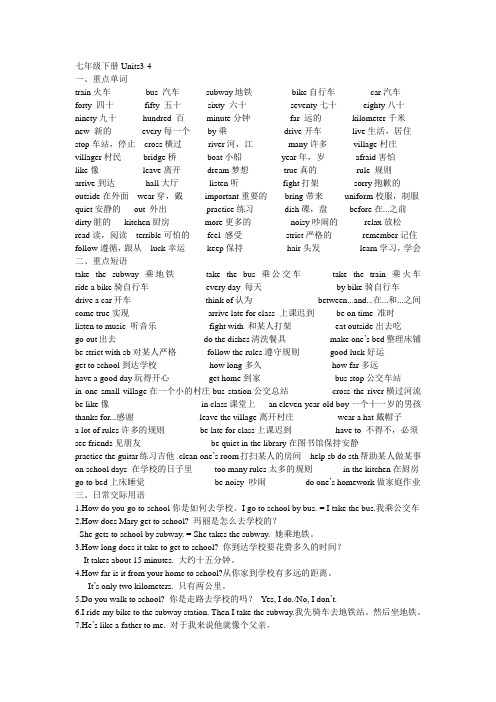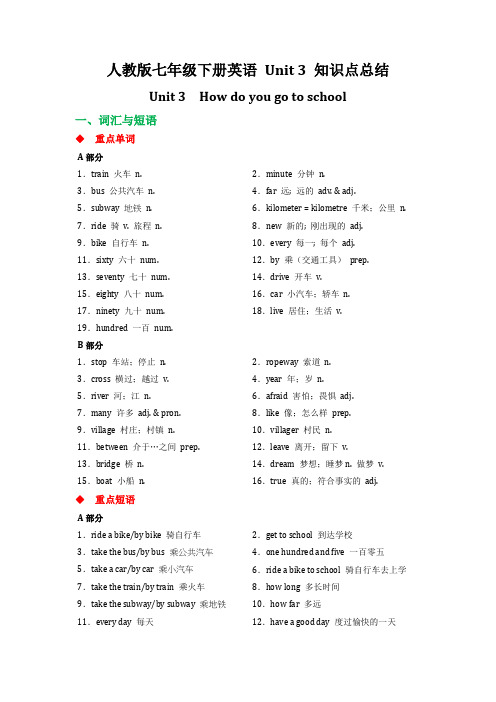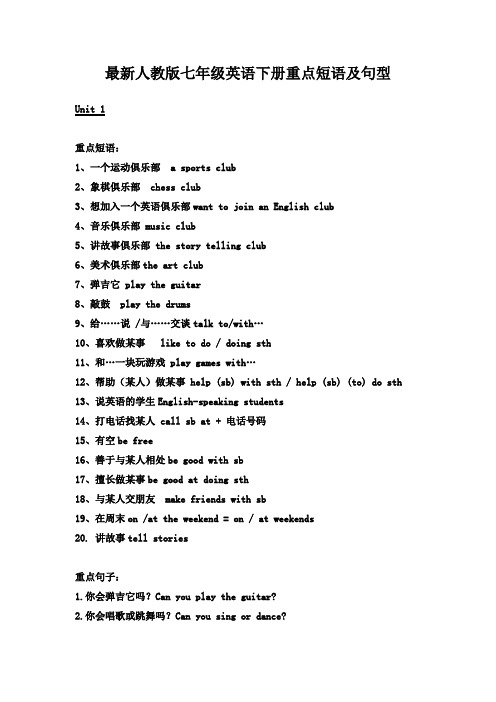人教版七年级下册Unit3-4核心考点归纳(语法+词汇+短语+重点句子)
七(下)第三,四单元知识梳理

七(下)第三,四单元知识梳理第三单元一、语法1、一般现在时:表示经常性或习惯性的动作,常和表示频度的时间状语连用。
2、一般过去时:表示过去发生的动作或存在的状态,常和表示过去的时间状语连用。
3、现在进行时:表示正在进行的动作或存在的状态,常和表示现在的时间状语连用。
4、现在完成时:表示动作已经完成,常和表示过去的时间状语连用。
5、“used to do”结构:表示过去经常性或习惯性的动作,但现在不做了。
二、重点句型1、What did you do last weekend?2、I used to get up late on weekends.3、What were you doing at 8 o'clock yesterday morning?4、I was having breakfast at 8 o'clock yesterday morning.5、Did you go to the movies last night?6、No, I didn't. I stayed at home and watched TV.第四单元一、语法1、祈使句:表示一种命令、请求或劝告,一般不用于疑问句,但可用于感叹句中。
2、感叹句:表示感情的强烈表达,可以是祈使句、疑问句或陈述句。
3、虚拟语气:表示一种假设或与事实相反的假设,一般用于陈述句和疑问句中。
二、重点句型1、Let's go to the movies.2、What a beautiful day!3、If I had enough money, I would travel around the world.4、Would you like to go to the beach with me?5、I wish I could fly to the moon.6、If only I had studied harder!。
初一(七年级)下册英语知识点:unit3-unit4

Unit 3 How do you get to school?一、重点语法:询问别人做某事的方式用How 引导特殊疑问句其回答有多种方式,其中一种结构是by doing sth. 或by sth. 的结构。
询问两地的距离用how far 引导特殊疑问句回答用be + (distance) + [away] + from 的结构。
例句:A: How do you get to school?(你如何去上学?)B: I take the subway.(我乘地铁去上学。
)A: How far is it from your home to school?(从家到学校多远?)B: It's three miles.(有三英里远。
)A: How long does it take you to get from home to school?(从家到学校需要花多长时间?) B: It takes 25 minutes.(要花25 分钟。
)二、重点短语:by bus = take the bus 乘公共汽车how far 多远depend on 依赖于by boat = take the boat 乘船look at 看by train = take the train 乘火车by bike = ride one's bike 骑车by subway =take the subway 乘地铁by plane = take the plane 乘飞机on foot 走路get up 起床have breakfast 吃早饭leave for somewhere 离开去某地take sb. to somewhere 带某人去某地half an hour = thirty minutes 半小时(三十分钟)around the world = all over the world 全世界get to school 到学校1.take the subway to … = go to … by subway 搭地铁2. take the train to … = go to … by train 坐火车3. take a bus to … = go to …by bus = go to … on a bus 乘坐公共汽车4. take a taxi to … = go to … by taxi 坐的士5. ride a bike/ bicycle to… = go to … by bike/ bicycle 骑自行车6. walk to… = go to … on foot 步行7. take a car to… = go to … in a car= go to … by car 坐汽车8. get to school 到达学校get to=arrive in/at=reach 到达(in加大地方at加小地方)9. 10 kilometers from school 离学校10公里(远)10. from…to… 从…到… from his home to school 从他家到学校11. how (用于提问状态和交通工具)怎样how long 用来询问时间的长度(用于提问时间段多长时间)或物体的长度how often (用于提问频率)多久时间一次how far (用于提问距离)多远how many 用于提问数量)多少how much(用于提问数量/价钱)多少/多少钱how soon“过多久”,用来询问某事要在多久以后才能发生12. have a quick breakfast 快速地吃早餐13. leave for school 出发去学校14. the early bus 早班车15.take sb. to school 带某人去学校Then the early bus takes him to school.然后,他乘坐早班车到学校16. bus ride 搭公车的路程17. bus stop 公车亭18. bus station 公车站bus stop 是指小站,bus station指大的站,比如汽车站。
七年级(下)Units 3-4重难点详解

七年级(下)Units 3-4重难点详解Unit 31. Let’s see the pandas first. 我们先看熊猫吧。
⑴Let’s do sth.结构是祈使句,表示邀请、建议,意为“让我们一起做某事吧”。
Let’s 是Let us的缩写形式。
对该祈使句进行回答时,肯定回答一般用OK./All right./Yes, let’s…等,否定回答一般用Sorry, I…等。
eg:——The box is too heavy. Let’s help him carry it. 这个箱子太重了,让我们帮他搬吧。
——All right. 好吧。
⑵do sth. first意为“首先做某事”,first在此为副词,修饰行为动词do。
eg:You must study Chinese well first. 首先你必须学好中文。
2. ——Why do you want to see the lions? 你为什么想去看狮子?——Because they’re cute. 因为它们可爱。
⑴这是一个由疑问副词why引导的特殊疑问句,用来询问原因。
应该用because来回答。
eg:——Why does he like tigers? 他为什么喜欢老虎?——Because they are fun. 因为他们有趣。
⑵want为动词,意为“想;想要”,后面可跟名词或动词不定式作宾语。
want sb. to do sth.表示“想要某人干某事”。
eg:Do you want to go to the zoo? 你想去动物园吗?My mother wants me to go shopping with her. 我妈妈想要我和她一起去购物。
3. Do you like giraffes? 你喜欢长颈鹿吗?⑴这是一个一般现在时的一般疑问句形式,用来询问对方的观点。
主语是you,所以用助动词do;若主语是第三人称单数,则用助动词does。
人教版七年级下第三、四单元知识重点

Unit3 How do you get to school?1.get to +地点名词, get to school 到达学校get +地点副词, get home/here/there 到家/这里/那里I’ll get to Beijing at six o’clock. When do you get home every day?2.take the/a/an +交通工具,是动词短语,在句中作谓语by +交通工具,是介词短语,在句中作壮语on/in + the/a/an/形容词性物主代词+交通工具, 是介词短语,在句中作壮语take the train = by train, take the subway= by subway, take the bus=by bus= on the bus, ride a bike= by bike= on a bike, by car= in the carwalk to+地点名词= on foot步行walk+地点副词I often go to school on foot. = I often walk to school.I ride my bike to school. = I go to school by bike. = I go to school on my bike.3.one hundred and five 105two hundred and forty-six 246There are about eight hundred students in their school.4.take花费It takes sb +时间+ to do sth.做某事花费某人多少时间.It takes me about ten minutes to get there by bus.5.how long多久,多长时间how far多远- How long does it take you to get to school?- It takes (me) about 15 minutes by bike.- How far is it from your home to our school?= How far is our school from your home?= How many kilometers is it from your home to our school?-It’s about 3 kilometers. / It’s about fifteen minutes’ ride/walk.6.live in +地点名词I live in Fuzhou.He lives about five kilometers from school.他住在离学校大约五公里的地方.7.Mary wants to know how Bob gets to school.玛丽想知道鲍勃怎样到达学校.这是一个含有how引导的宾语从句,从句的语序用陈述语序.8.What do you think of the story? = How do you like the story?你认为这个故事怎么样?9.between A and B 在A和B(两者)之间There is a very big river between their school and the village.10.no +可数名词单数= not a/an +可数名词单数not +可数名词复数/不可数名词单数= not any +可数名词复数/不可数名词单数There is no bridge here. = There is not a bridge here.I have no brothers. = I don’t have any brothers.11. (go )on a ropeway坐索道These students go on a ropeway to cross the river to school.12. a eleven-year-old boy一个11岁的男孩a 30-page book一本30页的书a three-room house一个三间的房子13. play with玩,与---玩I love to play with my classmates. Don’t play with fire.不要玩火.14. like动词,喜欢; 介词,像look like看起来像be like像My teacher is like a father to me.15. many of ---中的许多, many of us, many of her friendssome of ---中的一些, some of us, some of her friendsMany of us like watching TV.16. come true实现Can their dream come true?17. have to do sth 不得不做某事, don’t have to do sth不必做某事They have to cross the river. He has to do his homework.You don’t have to (不必) tell him.18. the bus ride乘公共汽车The bus ride takes about 20 minutes.Unit4 Don’t eat in class.1.祈使句的否定句:Don’t +动词原形+其它Don’t eat in class.Don’t be late for school.2. arrive late for = be late for迟到Don’t arrive late for class. = Don’t be late for class.3. arrive at +小地点名词到达某地arrive in +大地点名词arrive +地点副词He arrives at the bus stop at 8 o’clock every day.= He gets to the bus stop at 8 o’clock every day.When did you arrive in Beijing?= When did you get to Beijing?She arrives/ gets home/here/there at four o’clock. in the afternoon.4. on time准时We must get to school on time. You must be on time.5. listen to +宾语,指听的动作Hear +宾语,指听的结果Don’t listen to music in class.Can you hear anything?6.(1) must +动词原形,必须,一定,表示主观; mustn’t+动词原形,一定不要;肯定回答用must; 否定回答用need n’t不必(2) have to do sth, has to do sth 不得不做某事;don’t/ doesn’t have to do sth不必做某事(1) – Must I finish my homework? - Yes, you must. / No, you needn’t.(2) – Does he have to wear the school uniform?– Yes, he does. / No, he doesn’t.7. put on穿上,指穿的动作Wear穿着,戴着,指穿的状态be in +颜色,指穿着---色的衣服It’s cold (冷) outside. Put on your coat, please.We must/ have to wear the school uniform.She is in red.她穿着红色的衣服.8. too many +可数名词复数,太多的too much +不可数名词单数,太多的much too +形容词/副词,太There are too many rules in our school.He has too much homework this evening.The boy is much too fat (胖) .9. make breakfast做早饭, make (one’s) bed铺床, make rules制订规则She often helps her mom make breakfast.10. leave sth +某地,把某物遗望在某地I sometimes leave my keys in my room.11. be strict with sb对某人要求严格be strict in sth对某事要求严格My parents are strict with me. Our teacher is strict in his work.12 remember to do sth记住要去做某事,说明事情还没有做remember doing sth记得做过某事,说明事情已经做了Remember to call me.记住要给我打电话.(还没有打)I remember seeing her in the street.我记得在街上见过她.(已经见过)13. follow the rules遵守规则We have to follow the rules.14. keep+宾语+形容词,使---保持某种状态I must keep my hair short.15. learn to do sth学习做某事learn from向---学习I learn to play the guitar every day.We must learn from Lei Feng.16. have fun = have a good time玩得开心have fun doing sth开心地做某事We have fun playing football.。
七年级下册3-4单元知识点汇总

七年级下册Units3-4一、重点单词train火车bus 汽车subway地铁bike自行车car汽车forty 四十fifty 五十sixty 六十seventy七十eighty八十ninety九十hundred 百minute分钟far 远的kilometer千米new 新的every每一个by乘drive开车live生活,居住stop车站,停止cross横过river河,江many许多village村庄villager村民bridge桥boat小船year年,岁afraid害怕like像leave离开dream梦想true真的rule 规则arrive到达hall大厅listen听fight打架sorry抱歉的outside在外面wear穿,戴important重要的bring带来uniform校服,制服quiet安静的out 外出practice练习dish碟,盘before在...之前dirty脏的kitchen厨房more更多的noisy吵闹的relax放松read读,阅读terrible可怕的feel 感受strict严格的remember记住follow遵循,跟从luck幸运keep保持hair头发learn学习,学会二、重点短语take the subway乘地铁take the bus乘公交车take the train乘火车ride a bike骑自行车every day 每天by bike骑自行车drive a car开车think of认为between...and...在...和...之间come true实现arrive late for class 上课迟到be on time 准时listen to music 听音乐fight with 和某人打架eat outside出去吃go out出去do the dishes清洗餐具make one’s bed整理床铺be strict with sb对某人严格follow the rules遵守规则good luck好运get to school到达学校how long多久how far多远have a good day玩得开心get home到家bus stop公交车站in one small village在一个小的村庄bus station公交总站cross the river横过河流be like像in class课堂上an eleven-year-old boy一个十一岁的男孩thanks for...感谢leave the village离开村庄wear a hat戴帽子a lot of rules许多的规则be late for class上课迟到have to 不得不,必须see friends见朋友be quiet in the library在图书馆保持安静practice the guitar练习吉他clean one’s room打扫某人的房间help sb do sth帮助某人做某事on school days 在学校的日子里too many rules太多的规则in the kitchen在厨房go to bed上床睡觉be noisy 吵闹do one’s homework做家庭作业三、日常交际用语1.How do you go to school你是如何去学校。
最全面人教版七年级下册英语第三单元知识点归纳总结

人教版七年级下册英语Unit 3 知识点总结Unit 3 How do you go to school一、词汇与短语◆重点单词A部分1.train 火车n.2.minute 分钟n.3.bus 公共汽车n.4.far 远; 远的adv. & adj. 5.subway 地铁n.6.kilometer = kilometre 千米;公里n. 7.ride 骑v. 旅程n.8.new 新的; 刚出现的adj.9.bike 自行车n.10.every 每一; 每个adj.11.sixty 六十num.12.by 乘(交通工具)prep. 13.seventy 七十num.14.drive 开车v.15.eighty 八十num.16.car 小汽车;轿车n.17.ninety 九十num.18.live 居住;生活v. 19.hundred 一百num.B部分1.stop 车站;停止n.2.ropeway 索道n.3.cross 横过;越过v.4.year 年;岁n.5.river 河;江n.6.afraid 害怕;畏惧adj.7.many 许多adj. & pron.8.like 像;怎么样prep.9.village 村庄;村镇n.10.villager 村民n.11.between 介于…之间prep.12.leave 离开;留下v.13.bridge 桥n.14.dream 梦想;睡梦n. 做梦v. 15.boat 小船n.16.true 真的;符合事实的adj.◆重点短语A部分1.ride a bike/by bike 骑自行车2.get to school 到达学校3.take the bus/by bus 乘公共汽车4.one hundred and five 一百零五5.take a car/by car 乘小汽车6.ride a bike to school 骑自行车去上学7.take the train/by train 乘火车8.how long 多长时间9.take the subway/by subway 乘地铁10.how far 多远11.every day 每天12.have a good day 度过愉快的一天B部分1.think of 认为;想起2.subway station 地铁站3.bus station 公共汽车站4.train station 火车站5.bus stop公共汽车站台6.between…and…在…和…之间7.come true 实现;成为现实8.go on a ropeway 滑索道9.an/one 11-year-old boy 一个十一岁的男孩◆重点句子A部分1.How far is it from your home to school? 从你家到学校有多远?2.— How long does it take you to get to school? 你到学校花费多长时间?— About 15 minutes by bike. 骑车需要大约15分钟。
最新人教版七年级英语下册重点短语及句型归纳全册

最新人教版七年级英语下册重点短语及句型Unit 1重点短语:1、一个运动俱乐部 a sports club2、象棋俱乐部 chess club3、想加入一个英语俱乐部want to join an English club4、音乐俱乐部 music club5、讲故事俱乐部 the story telling club6、美术俱乐部the art club7、弹吉它 play the guitar8、敲鼓 play the drums9、给……说 /与……交谈talk to/with…10、喜欢做某事 like to do / doing sth11、和…一块玩游戏 play games with…12、帮助(某人)做某事 help (sb) with sth / help (sb) (to) do sth13、说英语的学生English-speaking students14、打电话找某人 call sb at + 电话号码15、有空be free16、善于与某人相处be good with sb17、擅长做某事be good at doing sth18、与某人交朋友 make friends with sb19、在周末on /at the weekend = on / at weekends20. 讲故事tell stories重点句子:1.你会弹吉它吗?Can you play the guitar?2.你会唱歌或跳舞吗?Can you sing or dance?3.你非常擅长讲故事。
You are very good at telling stories.4.学校文艺表演招募学生students wanted for school show5.来加入我们吧!Come and join us!6.我喜欢和人们一块谈话和玩游戏。
I like to talk and play games with people.7.放学后你忙吗?Are you busy after school?8.请拨293-7742找布朗先生。
Unit3--4重点知识点归纳-2021-2022学年七年级英语人教版下册

2022年春人教版七年级英语单元重点知识点归纳Unit3 How do you get to school?一、重点词组与句子Section A1. 坐火车take the train / by train2. 坐地铁take the subway / by subway3. 坐公共汽车take the bus / by bus4. 步行walk / on foot5. 骑自行车ride the bike6. 到达学校get to school7. 到家get home 8. 去上学go to school9. 去上班go to work 10. 105 one hundred and five11. 两百two hundred 12. 成百上千的hundreds of13. 每天every day 14. 公共汽车旅程the bus ride15. 多远how far 16. 多长时间how long17. 花费某人时间做某事It takes sb. st. to do sth. 18. 玩得愉快have a good time19. 从你家到学校from your home to school 20. 开(某人的)车drive one’s car 21. 在学校/在家/在上班at school/home/work 22. 一个小时one / an hour23. 步行上学walk to school / go to school on foot 24. 半小时half an hour25. 一个半小时one and a half hours / one hour and a half1. How do you get to school? I ride my bike.你怎样到达学校的?骑自行车。
2. How does she get to school? She usually takes the bus. 她怎样到达学校的?她通常坐公汽3. How long does it take to get to school? It takes about 15 minutes.到达学校要多长时间?大约要花费15分钟。
- 1、下载文档前请自行甄别文档内容的完整性,平台不提供额外的编辑、内容补充、找答案等附加服务。
- 2、"仅部分预览"的文档,不可在线预览部分如存在完整性等问题,可反馈申请退款(可完整预览的文档不适用该条件!)。
- 3、如文档侵犯您的权益,请联系客服反馈,我们会尽快为您处理(人工客服工作时间:9:00-18:30)。
人教版七年级下册unit3+4核心考点及语法归纳【unit 3语法】1、how 用于询问动作执行的方式、手段等,译为“怎样”。
如:—How do you usually go to school?你通常怎样去上学。
—On foot. 步行。
2、how 用于询问动作的执行程度,译为“怎样”。
如:—How do you like China?你觉得中国怎么样?—I like it very much. 非常喜欢。
3、how 用于询问身体健康状况,译为“怎么样”。
如:—How are you?你好吗?—I’m fine,thank you. 我很好,谢谢。
4、how 用在第一次见面的问候语中。
如:How do you do?你好!5、how about 用于询问或征询意见等,相当于what about ,后接名词、代词或动词的-ing 形式,译为“…怎么样”、“…好不好”。
如:I like playing football. How about you?我喜欢踢足球。
你呢?6、how many 用于询问人或物品的数量,后接可数名词的复数形式,译为“多少”。
如:—How many students are there in your class?你们班有多少名学生?—There are sixty-five. 六十五名。
7、how much 既可询问物品数量,后接不可数名词,译为“多少”;又可询问物品价格,译为“多少钱”。
如:—How much is the coat?这件大衣多少钱?—it’s fifty dollars.五十美元8、how old 用于询问年龄,译为“多大”。
如:—How old are you?你多大了?—I’m twelve. 我十二岁。
9、how far 用于询问距离,译为“多远”。
如:—How far is it from here to the station?从这里到车站有多远?—About three hundred metres. 大约三百米。
10、how long 既可询问抽象的时间长短,译为“多久”,也可询问具体的物品的长度,译为“多长”。
如:How long is the river?这条河有多长?How long will it last?这要持续多久?11、how often用于询问频率—How often do you exercise?你多久锻炼一次?—Every day.每天【unit 3重点句子】One 11-year-old boy,Liangliang,crosses the river every school day.十岁的男孩亮亮每天过河去上学。
Is this your new bike? 这是你的新自行车吗?I'm not sure.我不确定。
It is their dream to have a bridge.他们的梦想是有一座桥。
It takes about 40 minutes to get there by bus.乘公交车到那里需要花费大约40 分钟。
The bus ride takes about 20 minutes.乘公共汽车要花费大约二十分钟。
There is a very big river between their school and the village.在他们学校和村庄之间有一条很大的河。
Well,havea good day at school. 嗯,祝你上学愉快。
Do you walk or ride a bike? 你走路还是骑自行车?How do you get to school? 你怎样到学校?How far is it from your home to school? 从你家到学校有多远?-- How long does it take you to get to school?你到学校要花费多长时间?--About 15 minutes by bike. It's good exercise.骑自行车大约十五分钟。
它是很好的锻炼。
He’s like a father to me.他对我来说就像是位父亲。
Mary wants to know what he thinks of the trip.玛丽想知道他认为这段旅程怎么样。
【unit 3重点词汇】1、“实现梦想”的表达come true: 实现,成为现实(以物作主语,如梦想、目标等)Realize:实现,完成(以人作主语)My dream will come true some day.我的梦想终有一日会实现I will realize my dream some day.有朝一日我会实现梦想2、cross/acrosscross 为动词,表示横穿、穿过(从物体表面)across为介词,需要和相应的动词连用,如run across the street. Cross=动词+across注意与through区分,through指从“立体空间内”穿过3、get to/arrive at/ arrive in/reach这四个词组都可以表示到达arrive at+小地点,如arrive at school;arrive in+大地点,如arrive in China.Get与arrive作“到达”时均为不及物动词,需与介词构成短语后,方可加地点;Reach为及物动词,后面可以直接加地点4、speak/tell/talk/say(1)speak表示说话的能力或说某种语言,(2)tell表示告诉某人某事tell sb. about sth.或tell stories, tell lies, tell,也可以表示判断,辨别;(3)say表示说话内容;(4)talk表示交谈,如talk with/to sb或have a talk with sb.5、take a bus /by bus/ on a bustake a bus做谓语成分,表示坐公交by bus/on a bus做状语成分,by bus为抽象的交通方式,介词用by, 名词前没有任何冠词,on a bus 表示一种具体的交通方式,介词根据需要变化,名词前可有冠词或形容词,如in her car.6、take/ spendTake以“物”作主语,通常指花费“时间”常用句型应为it takes/took sb. +时间to do sth做...花费了...多长时间Spend以“人”作主语,可以花费“时间或金钱”常用句型应为spend +时间/金钱+ on sth/ (in) doing sth.【unit 3重点短语】an / one 11-year-old boy 一个11岁的男孩ride a bike 骑自行车subway station 地铁站train station 火车站think of 认为take the train / subway 乘火车/地铁/公共汽车by bike 骑自行车bus stop / station 公共汽车站between...and... 在........之间be afraid 害怕come true 实现;成为现实cross the river 穿过河流how far 多远how long 多久leave home 离开家many of 许多的drive a car 开车every day 每天every school day 每个上学日get to school 到学校go on a ropeway 滑索道play with 和.....一起玩【unit 4语法】祈使句一、祈使句指的是表示命令、请求、建议或劝告的句子。
其主语you常省略,谓语动词用原形,句末用感叹号或句号。
二、祈使句的肯定句式一般分为以下三种类型:1.行为动词原形+其它成分。
例如:Make your bed as soon as you get up.一起床就整理床铺2. Be动词+其它成分(形容词、名词或介词短语等)。
例如:Be careful when crossing the street.过马路时要小心。
3. Let+宾语+动词原形+其它成分。
例如:Let them go home now.让他们现在回家吧。
三.祈使句的否定句式祈使句的否定句式,一般分为以下四种类型:1.以动词原形开头的祈使句,在祈使句的肯定句式前加Do’t,构成『Don’t+行为动词原形+其它成分』。
例如:Don’t talk to him anymore !别再跟他讲话了!2.在Be动词引起的肯定祈使句前加Don’t,构成『Don’t be+其它成分(形容词、名词或介词短语等)』。
例如:Don’t be careless.不要粗心。
特别注意:be不能省略;否定副词not不可置于be之后。
3. Let引起的祈使句的否定形式有两种:(1)Let开头的祈使句,如果后面跟第一、第三人称名词或代词的宾格,可在Let前加Don’t,也可在Let后宾格的名词或代词后面加not。
例如:Don’t let me go with her tomorrow.=Let me not go with her tomorrow.不要让我明天跟她一起去。
(2)如果以Let’s开头的祈使句,必须在Let’s后加not。
Let’s not tell her the truth whenever we meet her.无论什么时候我们碰到她,都不要告诉她真相。
4.公共场合提示语中,否定祈使句常用『No+名词/V-ing形式』结构,表示『禁止做某事』。
例如:NO PHOTOS! 禁止拍照!NO SMOKING!禁止吸烟!四.祈使句的反意问句祈使句的反意疑问句须按其句子结构及讲话人语气来决定其疑问部分。
通常有以下三种形式:1.祈使句为肯定句式其反意疑问句表示请求时,通常用will you;表示邀请、劝说时,用won’t you。
例如:Be sure to write to us, will you? 你一定要给我们写信,好吗?Come to have dinner with us this evening, won’t you?今晚来和我们一起吃饭,好吗?2.祈使句为否定句式,其反意疑问句通常只用will you。
例如:Don’t smoke in the meeting room, will you?不要在会议室抽烟,好吗?3. Let开头的祈使句构成反意疑问句时,除Let’s用shall we外,其它均用will you。
例如:Let the boy go first, will you? 让个那男孩先走,好吗?Let’s take a walk after supper, shall we?晚饭后我们去散步,好吗?情态动词Must:··表示“必须,应该”之意,语气比should,ought to强烈。
